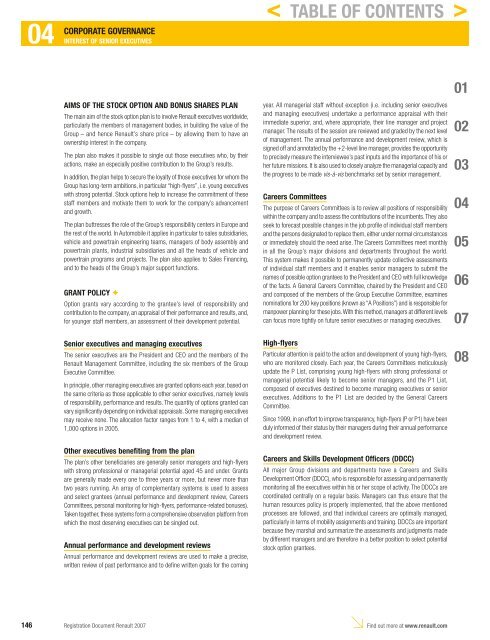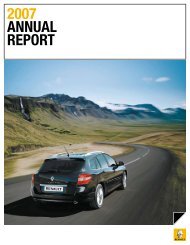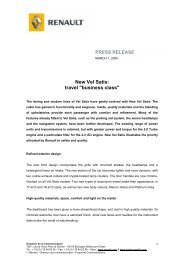2007 Interactive Registration Document - Renault
2007 Interactive Registration Document - Renault
2007 Interactive Registration Document - Renault
Create successful ePaper yourself
Turn your PDF publications into a flip-book with our unique Google optimized e-Paper software.
04 INTEREST<br />
CORPORATE GOVERNANCE<br />
OF SENIOR EXECUTIVES<br />
AIMS OF THE STOCK OPTION AND BONUS SHARES PLAN<br />
The main aim of the stock option plan is to involve <strong>Renault</strong> executives worldwide,<br />
particularly the members of management bodies, in building the value of the<br />
Group – and hence <strong>Renault</strong>’s share price – by allowing them to have an<br />
ownership interest in the company.<br />
The plan also makes it possible to single out those executives who, by their<br />
actions, make an especially positive contribution to the Group’s results.<br />
In addition, the plan helps to secure the loyalty of those executives for whom the<br />
Group has long-term ambitions, in particular “high-fl yers”, i.e. young executives<br />
with strong potential. Stock options help to increase the commitment of these<br />
staff members and motivate them to work for the company’s advancement<br />
and growth.<br />
The plan buttresses the role of the Group’s responsibility centers in Europe and<br />
the rest of the world. In Automobile it applies in particular to sales subsidiaries,<br />
vehicle and powertrain engineering teams, managers of body assembly and<br />
powertrain plants, industrial subsidiaries and all the heads of vehicle and<br />
powertrain programs and projects. The plan also applies to Sales Financing,<br />
and to the heads of the Group’s major support functions.<br />
GRANT POLICY ✦<br />
Option grants vary according to the grantee’s level of responsibility and<br />
contribution to the company, an appraisal of their performance and results, and,<br />
for younger staff members, an assessment of their development potential.<br />
Senior executives and managing executives<br />
The senior executives are the President and CEO and the members of the<br />
<strong>Renault</strong> Management Committee, including the six members of the Group<br />
Executive Committee.<br />
In principle, other managing executives are granted options each year, based on<br />
the same criteria as those applicable to other senior executives, namely levels<br />
of responsibility, performance and results. The quantity of options granted can<br />
vary signifi cantly depending on individual appraisals. Some managing executives<br />
may receive none. The allocation factor ranges from 1 to 4, with a median of<br />
1,000 options in 2005.<br />
Other executives benefiting from the plan<br />
The plan’s other benefi ciaries are generally senior managers and high-fl yers<br />
with strong professional or managerial potential aged 45 and under. Grants<br />
are generally made every one to three years or more, but never more than<br />
two years running. An array of complementary systems is used to assess<br />
and select grantees (annual performance and development review, Careers<br />
Committees, personal monitoring for high-fl yers, performance-related bonuses).<br />
Taken together, these systems form a comprehensive observation platform from<br />
which the most deserving executives can be singled out.<br />
Annual performance and development reviews<br />
Annual performance and development reviews are used to make a precise,<br />
written review of past performance and to defi ne written goals for the coming<br />
< TABLE OF CONTENTS ><br />
year. All managerial staff without exception (i.e. including senior executives<br />
and managing executives) undertake a performance appraisal with their<br />
immediate superior, and, where appropriate, their line manager and project<br />
manager. The results of the session are reviewed and graded by the next level<br />
of management. The annual performance and development review, which is<br />
signed off and annotated by the +2-level line manager, provides the opportunity<br />
to precisely measure the interviewee’s past inputs and the importance of his or<br />
her future missions. It is also used to closely analyze the managerial capacity and<br />
the progress to be made vis-à-vis benchmarks set by senior management.<br />
Careers Committees<br />
The purpose of Careers Committees is to review all positions of responsibility<br />
within the company and to assess the contributions of the incumbents. They also<br />
seek to forecast possible changes in the job profi le of individual staff members<br />
and the persons designated to replace them, either under normal circumstances<br />
or immediately should the need arise. The Careers Committees meet monthly<br />
in all the Group’s major divisions and departments throughout the world.<br />
This system makes it possible to permanently update collective assessments<br />
of individual staff members and it enables senior managers to submit the<br />
names of possible option grantees to the President and CEO with full knowledge<br />
of the facts. A General Careers Committee, chaired by the President and CEO<br />
and composed of the members of the Group Executive Committee, examines<br />
nominations for 200 key positions (known as “A Positions”) and is responsible for<br />
manpower planning for these jobs. With this method, managers at different levels<br />
can focus more tightly on future senior executives or managing executives.<br />
High-flyers<br />
Particular attention is paid to the action and development of young high-fl yers,<br />
who are monitored closely. Each year, the Careers Committees meticulously<br />
update the P List, comprising young high-fl yers with strong professional or<br />
managerial potential likely to become senior managers, and the P1 List,<br />
composed of executives destined to become managing executives or senior<br />
executives. Additions to the P1 List are decided by the General Careers<br />
Committee.<br />
Since 1999, in an effort to improve transparency, high-fl yers (P or P1) have been<br />
duly informed of their status by their managers during their annual performance<br />
and development review.<br />
Careers and Skills Development Officers (DDCC)<br />
All major Group divisions and departments have a Careers and Skills<br />
Development Offi cer (DDCC), who is responsible for assessing and permanently<br />
monitoring all the executives within his or her scope of activity. The DDCCs are<br />
coordinated centrally on a regular basis. Managers can thus ensure that the<br />
human resources policy is properly implemented, that the above mentioned<br />
processes are followed, and that individual careers are optimally managed,<br />
particularly in terms of mobility assignments and training. DDCCs are important<br />
because they marshal and summarize the assessments and judgments made<br />
by different managers and are therefore in a better position to select potential<br />
stock option grantees.<br />
146 <strong>Registration</strong> <strong>Document</strong> <strong>Renault</strong> <strong>2007</strong><br />
Find out more at www.renault.com<br />
01<br />
02<br />
03<br />
04<br />
05<br />
06<br />
07<br />
08




